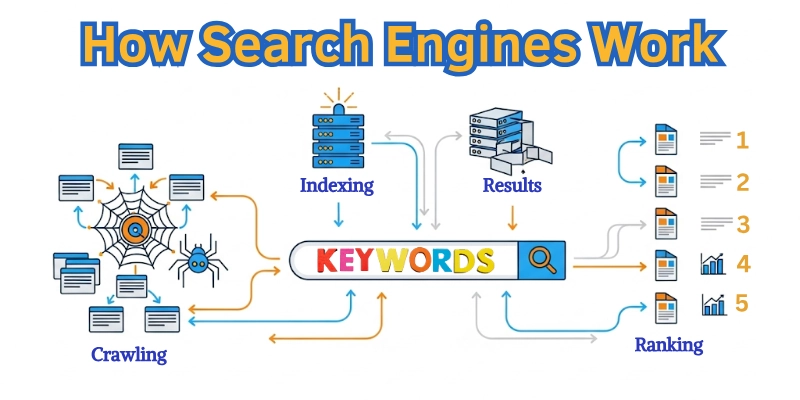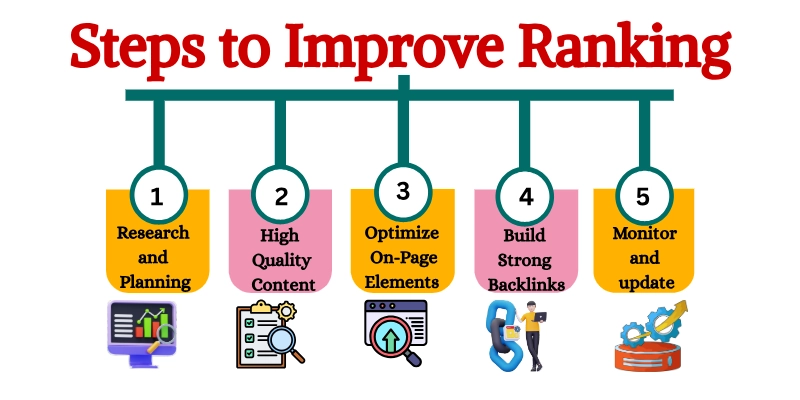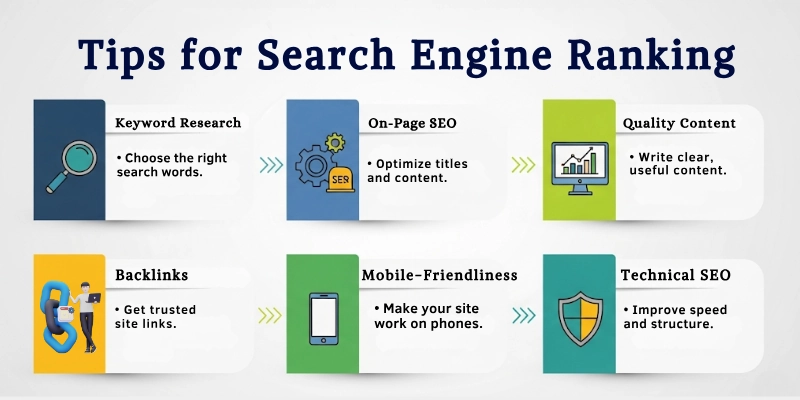How to Improve Search Engine Ranking and Get More Traffic
Published: 16 Sep 2025
More than 90% of people never appear on the first page of Google. So if your site is stuck on page two, it’s like opening a new store on a cool road where no one moves. Do you feel upset because your good material gets very little traffic? You’re not the only one. Why, when one site is the first site of Google, while the second rarely shows up? The secret Search Engine Ranking is that Google decides which pages are worth the best places.
A low ranking can also hide the most useful information. Here is good news: Basic that they are easier than sound. With the right steps, you can climb high in the search results and gain attention.
What Is Search Engine Ranking?
Search engine ranking is the position of a webpage in search results when someone types a keyword on Google or other search engines. A higher ranking means more people see your page and are more likely to click it. The closer you are to the top, the more traffic you can get.
How Search Engines Work
Search engines act as gigantic digital libraries. They find the internet, collect the web pages, and organize them so you can quickly find what you need. To do this, they follow some main steps:

- Crawling: Bots (also known as spiders) go on websites to find new or updated pages.
- Indexing: Pages are stored in a large database, similar to adding books to a library catalog.
- Ranking: Search engines determine which page keywords are worth top locations based on the quality of the material and the user experience.
- Serving results: When you find, the engine first shows the current page.
These steps work behind the scenes to bring you the best and most relevant results in seconds.
Key Factors That Affect Ranking
Many factors determine whether your site appears on the first page of Google or gets lost in the crowd. Search engines consider both the quality of the content and the overall health of your site. Knowing these most important factors will help you improve the ranking, attract more visitors, and increase your online presence.
1. Quality material
Good content search engines and readers to trust your site.
- Write the original and useful article.
- Answer the readers’ questions.
- Use small and simple sentences.
- Add examples of real life or case studies.
- Keep the content up to date and fresh.
- Arrange with clear titles and subheadings.
- Avoid copying or repeating other websites’ content.
- Tip: Always proofread to fix errors before publishing.
2. Keywords and search intentions
Keywords show what people find and match their intentions, which helps you rank higher.
- Find the most important keywords with devices such as Google Keyword Planner.
- Add keywords naturally to the title and text.
- Use related words to fully cover the topic.
- Match content to what readers really want (inform, buy, learn).
- Store keywords in titles and meta details.
- Avoid keyword stuffing, as, as it can hurt your rankings.
- Update keywords when trends change.
- Tip: Check the search trends frequently to stay ahead of your rivals.
3. Backlink
Backlinks are links to other websites that tell the search engine that your content is safe.
- Get links from honored and relevant websites.
- Create shareable content people want to link to.
- Write guest posts on reliable blogs.
- Create a relationship with industry experts.
- Check and remove a low-quality spammy link.
- Use internal links to add your own pages.
- Share your content on social media to attract the link.
- Tip: Instead of buying them, focus on earning the link naturally.
4. User Experience
A smooth and fast site keeps visitors happy and improves ranking.
- Make sure your site is quickly loaded on all devices.
- Use a mobile-friendly design.
- Keep navigation simple and clear.
- Use pure fonts and a simple reading setup.
- Avoid many pop-up windows or distractions.
- Add clear calls for the readers.
- Test the site often to fix a broken link.
- Tip: Use free tools like Google Pagespeed Insights to detect speed problems.
5. Technical SEO Basics
Strong Technical SEO helps search engines view your site.
- Add a website map to find the search engine page.
- Use HTTPS to keep your site safe.
- Make a short, clean, and descriptive URL.
- Fix the broken link or missing pages quickly.
- Use structured data to understand the search engines. Help the content to understand.
- Look for regular mobile responsibilities.
- Run a regular website audit to identify technical problems.
- Tip: Make a complete technical check every few months to keep the site healthy.
Steps to Improve Your Ranking
Want your website to show up higher on Google? Follow these simple steps to improve your ranking and attract more visitors.

1. Research and planning
Begin with thorough research to understand what your audience wants.
- List of the main themes of your readers.
- Find keywords with good traffic and low competition.
- Study competing blogs to detect content intervals.
- Keywords related to the group under a main idea.
- Check the Google Trends to see what’s popular now.
- Make a simple material plan to keep you consistent.
- Tip: Explore the most-visited pages of your rivals for motivation.
2. Create High-Quality Content
Great content keeps people reading and builds trust with search engines.
- Solve real problems with helpful, original posts.
- Write in clear, easily read languages.
- Add scenes such as images, charts, or infographics.
- Use bullet points and short paragraphs for easy scanning.
- Give examples of real life to explain complex ideas.
- Exit each post with a question or take steps to link readers.
- Tip: Update the old post when new information is available.
3. Optimize On-Page Elements
Smart on-page tweaks make your content easier to find.
- Add your main keywords and the first lines to the title.
- Write an attractive meta title that includes keywords.
- Write catchy meta descriptions that include keywords.
- Use titles (H1, H2, H3) to organize ideas.
- Add descriptive alt text to every image.
- Make small, clean URLs that match the topic.
- Link to other help pages on your site.
- Tip: Place the page title under 60 characters so that it appears well in the search results.
4. Build Strong Backlinks
Reliable links from other sites show Google that your content is valuable.
- Write guest posts for websites in your niche.
- Partners with experts or affected to share material.
- Creating a detailed guide or research will refer to others.
- Share your work on social media to reach more people.
- Find broken links on other websites and offer your content as a replacement
- Take part in online communities to build real relationships.
- Tip: Focus on getting a few high-quality backlinks instead of many low-value ones.
5. Monitor and update
Regular tracking helps you keep the ranking and grow.
- Use Google Analytics or Search Console to check performance.
- See which pages provide the most traffic.
- Update the old post with updated facts and scenes.
- Fix the broken link or missing pages quickly.
- Test the site’s speed and mobile friendliness.
- Compare your ranking with the big participants.
- Tip: Review your SEO plan after a few months and adjust the results.
5. Common Mistakes to Avoid
Avoiding these errors will help your site to be safe and rank better.
- Keyword stuffing: Overusing keywords makes content hard to read and can hurt rankings.
- Buying spammy backlinks: Low-quality paid links can lead to penalties from search engines.
- Ignoring mobile users: A site that isn’t mobile-friendly will lose visitors and ranking.
- Slow page speed: A slow website drives visitors away and lowers search performance.
- Weak or copied content: Unoriginal or thin content fails to impress both readers and search engines.
- Skipping regular updates: Old information can quickly become irrelevant and harm credibility.
- Poor internal linking: Missing links between your pages makes it harder for users and search engines to explore your site.
- Tip: Review your site every few months to catch and fix these issues early
Real-Life Examples
Real stories show how small changes can boost rankings.
- Case study: A small blog cut big pictures and quickly went to hosting. The speed of his site improved, and traffic doubled in three months.
- Title Twiks: A recipe site converted a pure title to “Fast 15-minute pasta recipes”. Clicks 40% increased in two weeks.
- Keyword Update: A technical blogger transferred the old keywords for trends and transferred from page three to the first page of Google.
- Mobile upgrade: A fashion store made its website mobile-friendly and saw a big decline in jumping prices and an increase in sales.
- Content update: A health site added new research and fresh pictures in an old post, which quickly climbed high in the search results.
- Tip: Try one change at a time so you can track what works exactly.
Quick Tips for Beginners
Starting with these simple habits will help you grow faster.

- First, be aware of the readers, search engines, and others: Write the material that answers real questions before you worry about the ranking.
- Post continuously with a simple plan: Regular updates, keep the audience busy, and help the search engine notice your site.
- Learn from analyses to guide your next post: Check Google Analytics or Search Console, which topics receive the most visitors and are liked the most.
- Keep the sentences shorter and easy to read: Clear writing makes your content beneficial for both humans and search engines.
- Use a strong title and a clear title: A good structure attracts clicks and improves readability.
Conclusion
Therefore, in this article, we have covered the search engine ranking in detail. From finding the right keywords to making high-quality materials and receiving strong feedback, each stage plays an important role in focusing on your site. My personal recommendation is to start small, focus first on improving content and user experience before chasing backlinks. To see your analysis to see what works and update the old post.
Remember that SEO is a journey, not a task. Be patient and be consumed, and your ranking will increase over time. Action today: give a tip from this guide and use ranking search engine on your site. Small steps lead to great results!
FAQs on Search Engine Ranking
Here are some of the most common FAQs people ask about ranking of search engine to help you understand the basics and improve your site’s visibility.
It’s the position of a webpage in the list of results when someone searches on Google or other search engines. Pages that rank higher get more clicks and visitors. The first page usually gets over 90% of all traffic.
A higher ranking means more people can find your website without paid ads. It builds trust and attracts visitors who are already looking for what you offer. This can lead to more sales, subscribers, or brand awareness.
Results can take a few weeks to several months, depending on your niche and competition. Regular updates and consistent SEO work speed up the process. Patience is key because ranking changes slowly.
Search engines check content quality, keyword use, backlinks, site speed, and mobile-friendliness. Good user experience and clean technical setup also matter. All these signals help search engines decide where to place your page.
Yes, organic SEO can get you to the top without spending on ads. Creating valuable content and earning quality backlinks are key steps. With steady effort, you can reach and stay on the first page.
Keywords tell search engines what your page is about. Placing them naturally in titles, headings, and content makes it easier for Google to match your page with searches. Always choose keywords that match user intent.
Backlinks are links from other websites pointing to your page. They act like votes of trust and authority. The more high-quality backlinks you have, the higher your page can rank.
Google favors websites that look good and work well on mobile devices. A mobile-friendly site gives visitors a better experience. This leads to higher engagement and better ranking.
Yes, slow websites frustrate visitors and make them leave quickly. This increases bounce rate, which can lower your ranking. Improving speed keeps users happy and boosts SEO.
You can use free tools like Google Search Console or paid tools like SEMrush. These tools show where your keywords stand in search results. They also highlight areas to improve for better ranking.

- Be Respectful
- Stay Relevant
- Stay Positive
- True Feedback
- Encourage Discussion
- Avoid Spamming
- No Fake News
- Don't Copy-Paste
- No Personal Attacks

- Be Respectful
- Stay Relevant
- Stay Positive
- True Feedback
- Encourage Discussion
- Avoid Spamming
- No Fake News
- Don't Copy-Paste
- No Personal Attacks





